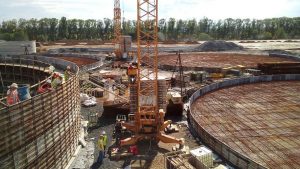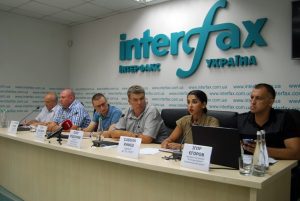
Ukrainian industry is one of the sectors of the economy most affected by the war. Since February 24, many large enterprises, primarily in the east and south of the country, have lost their production capacities, and the staff was forced to evacuate. At the same time, individual production facilities were transferred to the western regions, where they are being restored on the basis of more modern industrial facilities, such as industrial parks that appeared shortly before the war.
The Open4business portal spoke about the future of Ukrainian industry and the prospects for the restoration of production with Igor Stakovychenko, an expert in the field of economics.
According to the expert, the production of goods with high added value should become a priority for the development of the economy for decades to come.
“Before the aggression, our industry worked mainly according to standards that were not particularly modernized in 30 years of independence. This is the so-called canonical model, when you have raw materials, workshops, shipping, logistics, and so on. And there must also be stable consumers who will always buy products. Many plants with such a system failed the market test and closed down. Mostly giants remained, who more or less adapted. After the war, it will definitely not be possible to rebuild production in the same form, a fundamentally new model is needed, ”Igor Stakovichenko is sure.
The expert noted that in the modern world, the modernization of production involves the introduction of new management methods, as well as the creation of more adaptive sites, such as industrial zones or parks.
“If you have a workshop for the production of one specific part, which is itself part of a complex and long chain for creating the final product, then the situation above is rather precarious in modern conditions since you depend on many factors: suppliers, market situation, current conjuncture. If you have, for example, a 3D printer that can produce any shape to order for a specific client, then the situation is more stable for you, since you can quickly reorient yourself when the market changes. In the modern world, the industry is striving for greater universalization,” explained Igor Stakovichenko.
According to him, the restoration of the industry should begin now and be based, firstly, on the creation of industrial parks in safe regions, and secondly, on the modernization of existing industries for new models. As an example, Stakovichenko cites the development of this concept in Poland or the Czech Republic, where industrial zones already provide up to 50% of GDP.
“The government is now acting in the right direction, providing tax incentives to such industrial zones, this will lay the foundation for the rapid restoration of the country’s industrial potential in the post-war period,” Stakovichenko summed up.
ECONOMY, IGOR STAKOVICHENKO, INDUSTRY, MARKETS, PRODUCTION, STAKOVICHENKO

Prices in the Ukrainian industry in March 2021 increased by 1.6%, while in February – by 7.8%, in January – by 5.2%, the State Statistics Service reported on Monday.
At the end of March 2021, prices in industry increased 26.3% year-over-year, at the end of February – 26.6%, at the end of January 2021 – 17.6%.
In the first quarter of 2021 (compared to the same period in 2020), the growth in prices of industrial producers amounted to 23.5%.
The State Statistics Service said that within Ukraine, prices of industrial producers in March compared with February 2021 increased 0.6%, for deliveries outside the country – 4.7%.
In the mining industry and quarrying in March of this year, compared with the previous month, the price of production grew by 2.3%, the rise in prices in the extraction of metal ores was 5.8%, coal – 1.8%, while in extraction of crude oil and natural gas the products fell by 2% in price.
Prices increased in the production of coke and refined petroleum products by 14.2%, chemicals and chemical products – by 9.9%, in metallurgy – by 4.6%, in the production of intermediate consumption goods – by 4.2%, non-durable goods – by 3.7%, in the processing industry – by 3.8%.
A decrease in prices was recorded in the supply of electricity, gas, steam – by 5.5%, energy production – by 2.9%.

Industrial production in Ukraine in March 2021 increased by 2.1% compared to March 2020, which was the first month of the introduction of quarantine due to COVID-19, and the growth adjusted for the effect of calendar days was 2.4%, the State Statistics Service has said.
The department indicated that the growth of industrial production in March 2021 amounted to 10.9% against the previous month, and on a seasonally adjusted basis – 1.8%.
In the supply of electricity, gas, steam and conditioned air in March 2021 from March 2020, an increase was 7.3%, in processing industry – 2.5%, while the reduction in production in extracting industry was 1.5%.
The State Statistics Service clarified that in the first quarter of 2021 in relation to the same period a year earlier, industrial production in Ukraine decreased by 2%, in particular in mining industry – by 2.8%, processing – by 3.3%, although the supply of electricity, gas and steam gains 4.1% due to substantially colder weather.
As reported, industrial production in Ukraine in 2020 fell by 5.2% after falling by 0.5% a year earlier. At the same time, in December last year, for the first time since May 2019, its growth was recorded compared to the same period last year – by 4.8%.

Myronivsky Hliboproduct (MHP), one of the largest agricultural holdings in Ukraine, is working on a carbon dioxide plant project, deputy chairman of the board Oleksandr Dombrovsky has said when signing a memorandum of partnership between the agricultural holding and Organic Ukraine.
“This is an innovative project, I can’t tell you much. We are now doing a very professional feasibility study, considering various options. Today it is too early to say that we are ready for this project. We are working on it,” he said.
Dombrovsky clarified that the plant is being designed both for the needs of MHP itself, and for the domestic market and export. According to him, today about 70% of carbonic acid in the domestic market is imported, mainly from Poland and Hungary.
He also said that MHP, which has already built two of the world’s largest biogas complexes for processing poultry manure, has another ready-made similar project and a permit for its construction.
“But we are thinking to start or not to start. And if to start, then when, given that the “green” industry in Ukraine has not been paid money at all for six months,” Dombrovsky explained.
He stressed that investments in biogas are significantly higher than in solar energy, and range from EUR3 million to EUR3.5 million per 1 MWh of capacity.
The expert noted that the agricultural holding is also working on other innovative projects, in particular, on “green” hydrogen.
BIOGAS, CARBONIC ACID, GREEN POWER, INDUSTRY, INVESTMENT, MHP

On Thursday, July 30, the press center of the Interfax-Ukraine News Agency hosted a press conference, titled “Who Destroyed Ukraine’s Horse Breeding, and Why? How to Save the Industry? The Opinion of the Heads of Horse Breeding Enterprises.” The conference was attended by Director of Oleksandria stud farm of SE Horse Breeding of Ukraine Oleh Rodionov, Director of Dubrovsky stud farm of SE Horse Breeding of Ukraine Vadym Danylevsky, Director of Lozovsky stud farm of SE Horse Breeding of Ukraine Ihor Dubovyk, former Head of Odesa Hippodrome Kostiantyn Savchyts, President of the Anti-Corruption Entrepreneurial front Ihor Yehorov, lawyer of JSC Ri Group Sabina Knysh, as well as other directors of state-owned horse breeding organizations.
“We have gathered to tell Ukraine and people what is happening at the strategic enterprise. We will not ride to the Olympics on a pig. And such stud farms as Derkulsky, where ten generations of grooms, coaches, jockeys worked, have been completely ruined,” Oleksandria stud farm director Oleh Rodionov said.
Ihor Dubovyk, the director of the Lozovsky stud farm of SE Horse Breeding of Ukraine, said today the horse breeding industry is primarily based on state stud farms. He called on industry representatives to unite and convey their position to the authorities. According to him, the industry urgently needs to put things in order and provide state support to horse breeding.
“During the reform of the agro-industrial complex, livestock breeding in general, and especially horse breeding, suffered the greatest losses. Horses were distributed, sold, and wages were paid with horses. Until 1997, there were two stud farms and 18 pedigree horse farms in Ternopil region. To date, there is not a single stud farm and not a single breeding farm. Now horse breeders have to travel to the villages and beg, as there is simply nothing to feed the horses. What is this if not a crime?” Director of the Western Plemkonetsentr branch Yuriy Volynets said.
According to lawyer Sabina Knysh, on the basis of the documents received by the new management of the state enterprise, it was established that the heads of the stud farms of Luhansk region (Striletsky, Lymarivsky, Derkulivsky, Novooleksandrivsky) committed a number of offenses, with the use of state property, illegal operations for sowing, harvesting and selling crops in land plots owned by the Horse Breeding of Ukraine. It was also established that the managers appointed by Zinchenko K.M. have a criminal record, and that some were convicted of serious crimes.
“The schemes for the illegal receipt of profits from state lands are run by the local farmer-authority Khabib Makhachevich Batirsultanov, whose wife works in the prosecutor’s office of Luhansk region, and the funds are withdrawn through fictitious operations through Dubrava LLC controlled by Khabib,” Knysh said.
According to the lawyer, in order to retain power at the state enterprise Horse Breeding of Ukraine, Zinchenko, Orekhov O.V. (his deputy) in collusion with Batirsultanov and other interested persons have initiated actions blocking the activities of the new management of the enterprise, placed articles in the media and arranged protest actions and the like. The purpose of these actions is to focus public attention not on abuses on the part of Zinchenko and his team, but on the alleged usurpation of power in the state enterprise by Zhara K.K. (LLC Millennium), which previously provided services for sowing, processing and harvesting at the Horse Breeding of Ukraine.
“However, these facts are not confirmed by anything, which cannot be said about empty acts of acceptance and transfer of not yet grown, but not harvested crops between the Luhansk branch of Horse Breeding of Ukraine and LLC Dubrava,” the lawyer said.
Leading horse breeders of Ukraine have called on the Cabinet of Ministers to urgently intervene in the situation, bring the perpetrators to justice, create a commission comprised of specialists and develop an action program to bring the industry out of the crisis.





BREEDING, DANYLEVSKY, DUBOVYK, DUBROVSKY, HORSE, INDUSTRY, KNYSH, RODIONOV, SAVCHYTS, YEHOROV

On Thursday, July 30, at 14:00, the press center of the Interfax-Ukraine News Agency will host a press conference entitled “Who Destroyed Ukraine’s Horse Breeding and How to Save the Industry, and Why? The Opinion of the Heads of Horse Breeding Enterprises.” Participants include Director of Oleksandria stud farm of State-owned enterprise Horse Breeding of Ukraine Oleh Rodionov; Director of Dubrovsky stud farm of State-owned enterprise Horse Breeding of Ukraine Vadym Danylevsky; Director of Lozovsky stud farm of State-owned enterprise Horse Breeding of Ukraine Ihor Dubovyk; former Head of Odesa Hippodrome Kostiantyn Savchyts; President of the Anti-Corruption Entrepreneurial front Ihor Yehorov; lawyer Sabina Knysh, as well as other directors of state-owned horse breeding organizations (8/5a Reitarska Street). The press conference will be broadcast on the YouTube channel of Interfax-Ukraine. Admission of journalists requires registration on the spot.
BREEDING, HORSE, INDUSTRY, INTERFAX-UKRAINE, PRESS CONFERENCE